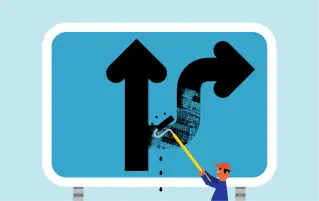When It's OK to Ignore the Gospel on Retirement

You already know what you're supposed to do: Contribute the maximum to your 401(k) or other retirement plan at work. Lock up your money until you retire. Right?
Wrong. While that's good advice, it's not always the best advice. We don't all live the same life.
My friend Tim Donohue, for one, didn't want to be forced to live a particular life. So after college, he set himself a goal: Save a year's worth of living expenses in cash. He did that, then decided to save another year's worth. He did that too.
Tim couldn't retire, of course. But with this outsize stash of cash, he had bought a degree of financial freedom by age 25 that even executives in their sixties might not enjoy. If Tim felt trapped in a dead-end job, he could (a) quit, (b) go back to school, (c) move to another city, or (d) do all of the above.
So Tim, now 41, was able to risk his livelihood by moving across the country. Knowing he had options has widened his view of his life's possibilities. In contrast, by dedicating all our savings to a distant retirement, we may deprive ourselves of enjoying a taste of financial independence until then.
Focus on your match
It's not so hard to apply Tim's strategy to your life. Instead of maxing out your 401(k), max out your employer match—the free money your company contributes to your retirement. Muscle up your cash savings and set up a plan to hit a target comparable to Tim's.
Keep saving for retirement, but in an account that's easier to tap: a Roth IRA. Your money grows tax-free and isn't taxed on withdrawal. You can put in up to $5,500 this year ($6,500 if you're at least 50), or a lesser amount that starts heading to zero once your income exceeds $184,000 if married, or $117,000 if single. You can pull contributions for any reason, without penalty.
Then invest what you can for the midterm in an old-fashioned, liquid, taxable investment account. The investment mix should be less aggressive than your retirement portfolio's, but not all-cash like your short-term savings. A 45-year-old with a 75% stock/25% bond retirement account, for example, might want a 60%/40% split for this "Who knows?" fund.
Be realistic
I'm not trying to gloss over the fact that a secure retirement requires concerted saving. But I do want to argue that tomorrow is promised to none of us, and savings aren't reserved for IRS-sanctioned plans.
If you know that the only way you can avoid blowing your money is to lock it in a 401(k), then do so. Remember, though, that the present and the midterm are just as worthy of investment as your more distant future. Liquidity and flexibility—perhaps because they are intangible—are often undervalued. In fact, they are two of the greatest benefits money can buy.
Financial planner Tim Maurer is the author of Simple Money and director of personal finance for the BAM Alliance.